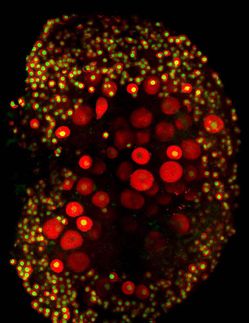Sensitizing tumor response to cancer therapy
Two forms of skin and brain cancer respond very poorly to chemotherapy and radiation: melanoma and glioblastoma multiforme brain cancer. Both are the focus of an intensive effort in the department of nutritional sciences at The University of Arizona to find natural, biologically active compounds that will sensitize the cancerous tumors to therapy without damaging normal tissue. By using the compounds in conjunction with conventional treatment, the researchers hope patient survival rates will ultimately increase.
Dacarbazine, the standard chemotherapeutic drug for melanoma for decades, has been ineffective when used alone. To improve its performance, Randy Burd, assistant professor of nutritional sciences and member of the UA's BIO5 Institute, has been testing the drug and its new analog Temozolomide in combination with various bioactive compounds to gain greater response rates on melanoma tumors in cell cultures.
"After working with COX-2 inhibitors – which had complications – we started looking at quinones, which occur in nature as pigments, vitamin biochemical backbones and plant compounds, and then we analyzed the enzymes involved in their activation," Burd said.
Quercetin, a polyphenol found in apples, onions, green tea and other plant-based foods, is a quinone that has shown an interesting effect on melanoma tumors. In low concentrations quercetin behaves as an antioxidant, yet at high concentrations it becomes a cell-damaging pro-oxidant.
Burd's group is exploiting the pro-oxidant attribute of quercetin, using tyrosinase, which is the highly expressed enzyme responsible for the pigment formation in human skin cells that grow out of control in melanoma.
"The quercetin is similar to precursors of melanin," Burd said. "The tyrosinase actually recognizes and activates quercetin to a pro-oxidant rather than an antioxidant."
When tested together in melanoma tumor cell cultures, the result is tumor cell death. The melanoma enzyme is tricked into activating so much quercetin that it turns around and sensitizes the melanoma cells to the chemotherapy drug, and they die.
Quercetin is an example of a biological response modifier, which is a drug or a compound that changes the function of tumor cells so they will be more responsive to chemotherapy or radiation, according to Burd.
The team is now screening a library of bioactive food and plant compounds to find out if they kill tumor cells for different cancers, and if they do, what genes or proteins are involved in their activity.
Most read news
Topics
Organizations
Other news from the department science

Get the life science industry in your inbox
By submitting this form you agree that LUMITOS AG will send you the newsletter(s) selected above by email. Your data will not be passed on to third parties. Your data will be stored and processed in accordance with our data protection regulations. LUMITOS may contact you by email for the purpose of advertising or market and opinion surveys. You can revoke your consent at any time without giving reasons to LUMITOS AG, Ernst-Augustin-Str. 2, 12489 Berlin, Germany or by e-mail at revoke@lumitos.com with effect for the future. In addition, each email contains a link to unsubscribe from the corresponding newsletter.
Most read news
More news from our other portals
Last viewed contents
Novel Anti-inflammatory Mechanism of Elafin























































